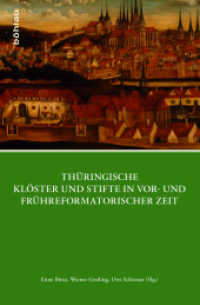- ホーム
- > 洋書
- > ドイツ書
- > Humanities, Arts & Music
- > History
- > miscellaneous
Description
A new approach to the study of slavery in the Ottoman Empire Slaves and Slave Agency in the Ottoman Empire offers a new contribution to slavery studies relating to the Ottoman Empire. Given the fact that the classical binary of 'slavery' and 'freedom' derives from the transatlantic experience, this volume presents an alternative approach by examining the strong asymmetric relationships of dependency documented in the Ottoman Empire. A closer look at the Ottoman social order discloses manifold and ambiguous conditions involving enslavement practices, rather than a single universal pattern. The authors examine various forms of enslavement and dependency with a particular focus on agency, i. e. the room for maneuver, which the enslaved could secure for themselves, or else the available options for action in situations of extreme individual or group dependencies. Stephan Conermann, PhD, is the Speaker of the Bonn Center for Dependency and Slavery Studies, and the Dean of the Faculty of Arts at the University of Bonn. His research interests include slaveries, narrative strategies in historiographic texts, transition periods, reconciliation processes, global history, and rule and power. His work is focused on the Mamluk and Delhi Sultanates, the Mughal and Ottoman Empires, and the Crossroads Area "Transottomanica." PD Dr. Gül Sen habilitierte sich an der Universität Bonn und erhielt Venia Legendi für das Fach Islamwissenschaft. Derzeit ist sie als Vertretungsprofessorin für Islamwissenschaft an der Universität Heidelberg tätig. Yehoshua Frenkel is Professor of Middle Eastern History at the University of Haifa. His research interests embrace popular culture, Islamic etiquette, communal practices, social history, and legal discourse in Middle and Late Caliphate Egypt and Syria (1055-1517). Dr Veruschka Wagner is a historian of the Ottoman Empire and a Researcher at Bonn University. Stephan Conermann, PhD, is the Speaker of the Bonn Center for Dependency and Slavery Studies, and the Dean of the Faculty of Arts at the University of Bonn. His research interests include slaveries, narrative strategies in historiographic texts, transition periods, reconciliation processes, global history, and rule and power. His work is focused on the Mamluk and Delhi Sultanates, the Mughal and Ottoman Empires, and the Crossroads Area "Transottomanica." PD Dr. Gül Sen habilitierte sich an der Universität Bonn und erhielt Venia Legendi für das Fach Islamwissenschaft. Derzeit ist sie als Vertretungsprofessorin für Islamwissenschaft an der Universität Heidelberg tätig.








